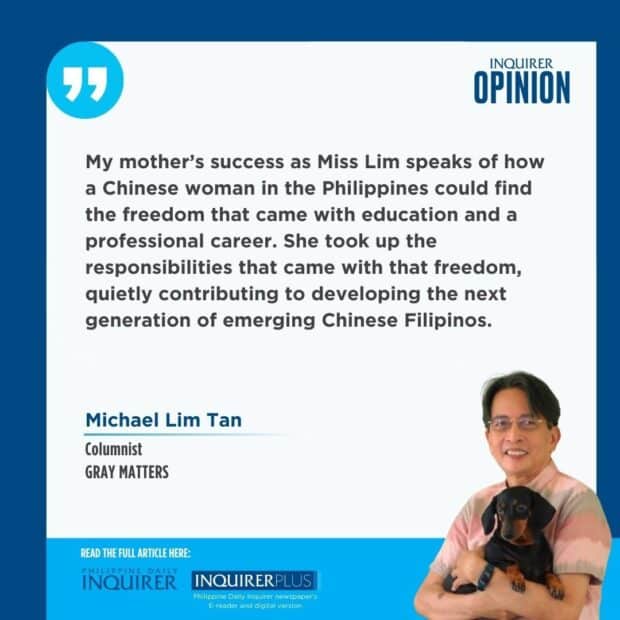Miss Lim

My sister and I grew up getting used to going out with our mother and being chased by people calling out, “Miss Lim, Miss Lim,” wanting to greet my mother, asking how she was, and then updating her on their own lives, including introducing her to their children, “This is Miss Lim, my teacher from many years ago.”
The conversations were always in Hokkien, the language used by most ethnic Chinese in the Philippines, and my mother’s students would refer to her as their “siensi,” the Hokkien term for Chinese, actually a term of honor, said with reverence.
My mother wasn’t just respected but loved, and I realized, over the years, that it wasn’t so much for expertise in a particular field, as is often the case with college instructors. The mark of a good grade school or high school teacher—which I wish were used more often for college faculty—was the nurturing aspects of teaching.
I suspect many of my mother’s former students are probably unaware of her background, and what she went through to become a teacher, circumstances that, I am certain, made her such a memorable teacher.
I’m also weaving into the story this matter of Miss Lim, sometimes Miss Nene Lim—some of you may be wondering why I didn’t use Mrs. Tan and the reason was simple: she was remembered, long after she married, by her maiden surname, which had become so much a part of her identity as a teacher.
I write about this matter of surnames as a kind of sequel to a column I did a few months back about why I spell out both my maternal and paternal surnames, reflecting the changing norms in many countries, the Philippines and China included, to recognize the contributions of women as they carved out the heavy responsibilities of raising a family while working outside the home.
My maternal grandfather, who migrated from China to the Philippines at the turn of the 20th century, was quite liberal, sending his children to attend non-Chinese schools rather than one of the many Chinese institutions that had sprouted throughout the Philippines. My maternal uncles mostly went to De la Salle and my mother went to St. Scholastica’s. It wasn’t surprising they were very much assimilated into the Filipino mainstream, no Chinese accent in their English or Filipino, as well as in terms of social norms and cultural practices. Yet, at home, they continued to speak Hokkien and my mother was even able to read and write Chinese script.
The “kulasa” (St. Scholastica) imprint on my mother was visible with independence and assertiveness. After she finished high school, she resisted the pressure to be married off, as was the Chinese custom. Moreover, she chose to pursue college at the Philippine Women’s University, where she finished her bachelor’s degree in home economics, later adding more units to get a degree in education.
Almost immediately after graduation, she got teaching jobs in two Chinese schools: Quiapo Anglo-Chinese School and St. Stephen’s. After all, she had rare qualifications as an ethnic Chinese woman who could speak English, Chinese, and Filipino, and whose training meant she could handle different subjects. She was assigned English, arithmetic, and various aspects of home economics (e.g., cooking, sewing).
In the early years after World War II, my mother often had students who were about her age, or older—students who had stopped schooling because of the war, or new immigrants from China. Teaching loads were heavy including preparing lesson plans and taking home the many test papers to correct while handling domestic chores.
Life became even harder after marriage because she had turned her back on an arranged marriage, which would have assured her a life of luxury. Throughout most of her teaching career, she took public transportation, mainly jeepneys and kalesa, and when she took on home tutoring assignments, she’d navigate the eskinita (alleyways) of some pretty tough neighborhoods in Quiapo and Santa Cruz, even at night.
Miss Lim was such an integral part of her identity as a teacher, so much so that even my father accepted, with good humor, being addressed as Mr. Lim. That was exceptional, considering that my mother belonged to an era where, borrowing the American norm, married women faced erasure of their lives before marriage. For many years, I would find letters still addressing my mother as Mrs. Julio Tan.
Add on the fiercely patriarchal traditions of the Chinese in the Philippines, then and now. But my mother’s success as Miss Lim speaks of how a Chinese woman in the Philippines could find the freedom that came with education and a professional career. She took up the responsibilities that came with that freedom, quietly contributing to developing the next generation of emerging Chinese Filipinos.
-mtan@inquirer.com.ph
















